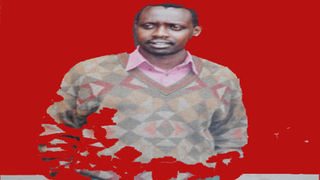
The late Meshack Yebei. His mutilated body was found floating in a river in January 2015 after he disappeared on December 28, 2014, from Turbo town. He was a neighbour of the Deputy President.
| FileNews
Premium
ICC goes for ‘hostile’ witness before Paul Gicheru case starts next month
An International Criminal Court prosecutor wants judges to order a crucial witness in the Paul Gicheru case to attend proceedings at The Hague.
The case, which starts on February 15, also touches on Deputy President William Ruto and radio journalist Joshua arap Sang.
Although the prosecutor has redacted the whereabouts of P-0743, he has asked the ICC to force him to appear before the court.
The prosecution argues that P-0743 was one of the witnesses that Mr Gicheru paid to turn into a hostile witness, which led to the collapse of the crimes-against-humanity case against Dr Ruto and Mr Sang.
Mr Gicheru is accused of running a witness corruption scheme that sabotaged the case against the two, who had been charged with masterminding the 2007 post-election violence.
In a previous brief in the Gicheru case, the prosecutor had named Dr Ruto saying, “The evidence establishes that the pattern of witness interference was conducted for the benefit of, and in coordination with, William Samoei Ruto”.
The prosecutor, in a newly filed document, also wants the court to “request” the assistance of an unidentified government in ensuring the attendance of the witness, “using all means available under law” before the case starts.
Meshack Yebei
The records show that this was one of the witnesses who had implicated Mr Gicheru and the late Meshack Yebei as being involved “in a series of concerted activities …in exchange for money”.
He had also told ICC investigators that “other prosecution witnesses had been improperly interfered with”. Mr Yebei – thought to have become a prosecution witness – was later abducted in Eldoret in December 2014 and his badly mutilated body was found in January 2015 at Tsavo National Park.
He had a gunshot wound in his head and his genitals had been cut off. Both the defence and prosecution claimed he was their witness.
During the Ruto case, P-0473 was dismissed as a hostile witness and the ICC prosecutor now has an audio-recorded statement stating that Mr Gicheru and others had influenced him. However, the ICC prosecutor says he is unable to get this witness to testify voluntarily.
The prosecutor argues that the witness is crucial in determining the truth in the Gicheru case, which might also determine the fortunes of Dr Ruto at the ICC.
While the High Court in Kenya had quashed an ICC warrant of arrest against Mr Gicheru issued on March 10, 2015 and unsealed on September 10, 2015, his surrender in The Hague on November 2, 2020 came as a surprise – even to his Kenyan lawyers.
The ICC chambers have the powers to compel a witness to testify after a case-by-case assessment. It can also require a State Party to employ compulsory measures to compel the summoned witness to appear.
The prosecutor had thought of relying on the original testimonies of the witnesses before they recanted. But the ICC, ruling on the use of the recorded testimony of witness P-0495, held that the prosecutor had not used “all reasonable efforts at its disposal” to get the witness to attend.
After Mr Gicheru surrendered in The Hague, the office of the prosecutor said it tried to get P-0743 using “all available means, directly and through the use of third parties…to no avail”.
“Despite the fact that Mr Gicheru is not charged in respect of the corrupt influence of P-0743, the Prosecution submits that the anticipated testimony of this witness has a sufficient nexus to the crimes charged to be considered relevant for the purposes of issuing a summons to appear,” says the prosecution in the filing dated January 19.
Common Plan
“At a minimum, his evidence – if accepted – will corroborate the evidence of other Prosecution witnesses as to the existence of the Common Plan, the identity of its members, it’s modus operandi and the Accused’s role in its activities.”
The prosecution adds: “Gicheru made an essential contribution to the charged offences by …arranging for Corrupted Witnesses to sign affidavits recording their decisions to withdraw as Prosecution Witnesses and/or recanting material aspects of their previous evidence and/or making false assertions undermining the Prosecution’s case against Ruto and Sang.”
Court papers quote witnesses saying that Mr Gicheru was “a close friend of Ruto and they had attended Kapsabet High School together”. A class of 1986 school alumni magazine shows the two were indeed in the same year.
The case against Mr Gicheru opens in a crucial period in Kenya, with the elections set for August and with Dr Ruto as one of the leading candidates.
Although Dr Ruto has not been summoned, those named in court papers as members of the Common Plan to sabotage the Ruto case include the managers: Mr Gicheru, Amaco Insurance boss Silas Kibet Simatwo and Isaac Maiyo, chairman of the Constituencies Development Fund for Eldoret North.
The intermediaries were Meshack Yebei, Philip Bett and Walter Barasa, a journalist.
[email protected]; @johnkamau1





